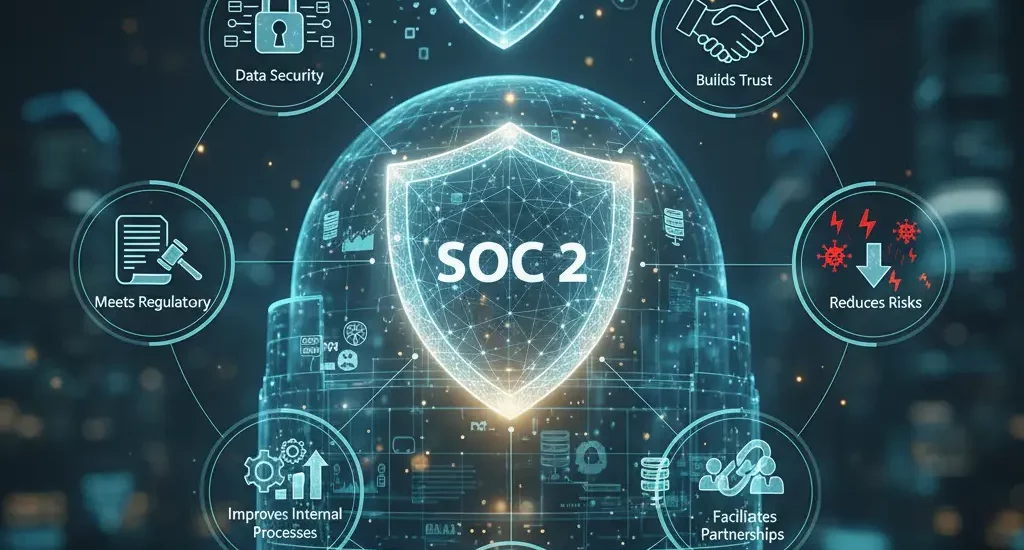What is SOC 2 and Why Is It Important for Businesses Today?
- November 18, 2025
- Posted by: Gradeon
- Category: Cyber Security

In an age where data has become one of the most valuable assets an organisation can hold, maintaining trust, security, and compliance is no longer optional. Every business that stores, processes, or transmits customer data faces constant risks from cyber threats, regulatory pressures, and rising customer expectations. This is where SOC 2 comes into the picture. It has rapidly become one of the most recognised and respected compliance standards for modern companies, especially those in technology, finance, healthcare, and cloud-based services.
Understanding SOC 2
SOC 2 stands for Service Organisation Control Type 2. It is a voluntary compliance framework developed by the American Institute of Certified Public Accountants (AICPA). Although created by a US-based body, SOC 2 reports are now globally accepted as a benchmark for data security and service reliability.
The SOC 2 framework focuses on how a business manages customer data based on five Trust Service Criteria:
- Security
Protection of data and systems from unauthorised access. This is the core element of every SOC 2 audit and applies to all SOC 2 reports. - Availability
Ensuring that systems and services remain operational and accessible as promised in service level commitments. - Processing Integrity
Guaranteeing that system processing is complete, valid, accurate, and timely. - Confidentiality
Protecting sensitive information from unauthorised use or exposure. - Privacy
Managing personal information responsibly and in line with stated privacy policies.
SOC 2 reports come in two forms:
- SOC 2 Type I, which reviews the design of security controls at a specific point in time.
- SOC 2 Type II, which evaluates how well those controls operate over a period, usually between three and twelve months.
For businesses seeking credibility and stronger customer trust, SOC 2 Type II is the more powerful and commonly requested version.
Why SOC 2 Is Important for Businesses Today
1. Rising Cybersecurity Risks
Cyberattacks are becoming more frequent and more sophisticated. Ransomware, phishing, data breaches, and insider threats continue to increase year after year. Customers want assurance that their data is safe with the organisations they interact with. SOC 2 compliance provides that assurance.
A SOC 2 certified business demonstrates that it has put robust technical and organisational security measures in place to minimise risks and respond quickly if incidents occur.
2. Builds Trust With Clients and Partners
Trust has become a competitive advantage. Companies evaluating a service provider, especially one that handles sensitive or regulated information, often ask for a SOC 2 report as part of their due diligence.
For B2B companies, a SOC 2 certification can make the difference between winning and losing a contract. It acts as a third party validation that your organisation takes security seriously and follows industry recognised best practices.
3. Mandatory in Many Industries
While SOC 2 is technically voluntary, many industries treat it as an informal requirement. Cloud computing providers, SaaS companies, payment processors, marketing technology platforms, and IT service providers frequently need SOC 2 compliance to operate or to maintain partnerships.
Many large enterprises and public sector organisations will not work with vendors that cannot provide a SOC 2 Type II report. Having this certification opens the door to more opportunities.
4. Strengthens Internal Security Practices
SOC 2 is not just a certificate; it is a structured framework that guides organisations towards stronger internal controls. Businesses undergoing SOC 2 assessments often discover gaps in their existing security posture such as weak access controls, outdated policies, unmonitored system activity, or insufficient incident response planning.
By addressing these gaps, companies become more resilient and better prepared for emerging cyber risks. It also fosters a culture of accountability, documentation, and continuous improvement.
5. Reduces the Risk of Data Breaches
Data breaches can be financially devastating, but the reputational damage can be even worse. SOC 2 requires companies to follow stringent guidelines around logging, monitoring, access control, encryption, and security training. These measures help reduce the likelihood of breaches and minimise the impact if an incident occurs.
A SOC 2 compliant company is more likely to detect suspicious activity earlier and respond effectively.
6. Provides a Competitive Advantage
In a crowded market, SOC 2 can be a powerful differentiator. It signals that an organisation has invested time, effort, and resources into protecting client information. Many customers feel more comfortable choosing a business that has undergone an independent audit rather than taking vague claims of “strong security” at face value.
For startups and small businesses, SOC 2 compliance can help build credibility quickly and compete with larger, more established players.
7. Supports Global Expansion
Even though SOC 2 was developed in the United States, it aligns well with international privacy and security expectations. Many companies rely on it when expanding to new regions or when managing cross border operations. It provides reassurance to stakeholders from different jurisdictions that the organisation follows trustworthy and consistent security practices.
Conclusion
SOC 2 has become a crucial requirement for modern businesses that rely on trusted cybersecurity consultancy and secure data handling practices. It helps organisations strengthen data protection, improve system reliability, and uphold transparency in every part of their operation. As cyber threats continue to rise and clients demand stronger security assurance, SOC 2 compliance allows a cybersecurity consultancy to demonstrate proven expertise, robust security controls, and a commitment to industry recognised standards.
For any business that wants to scale, build deeper customer trust, and manage cyber risks more effectively, SOC 2 is essential. It supports strong risk management, protects sensitive information, and reinforces the value that professional cybersecurity consulting services provide. By investing in SOC 2 audits and improving internal controls, companies and their cybersecurity consultants can enhance credibility, attract higher value clients, and maintain a competitive advantage in a fast evolving digital environment.
